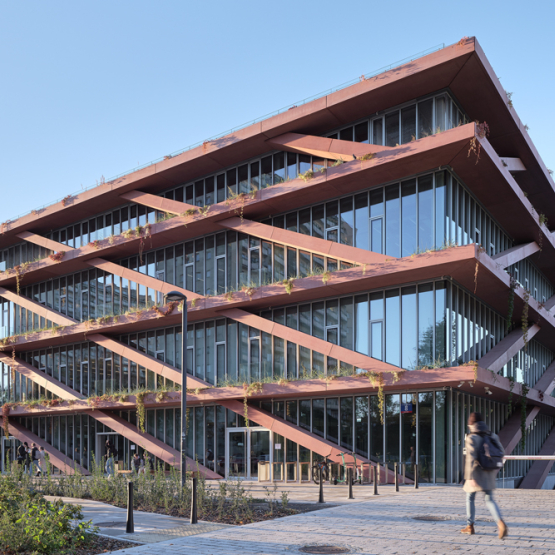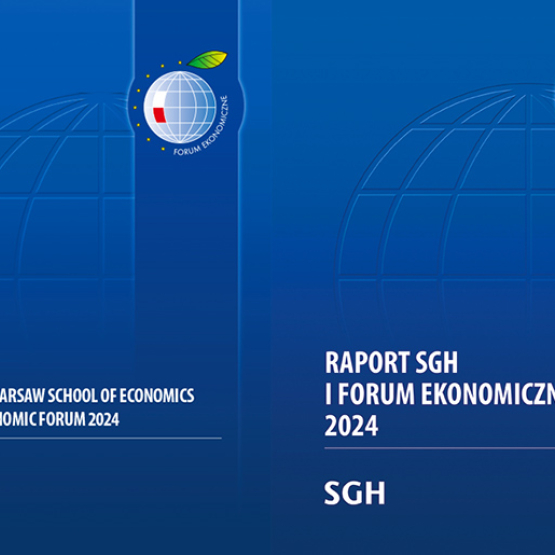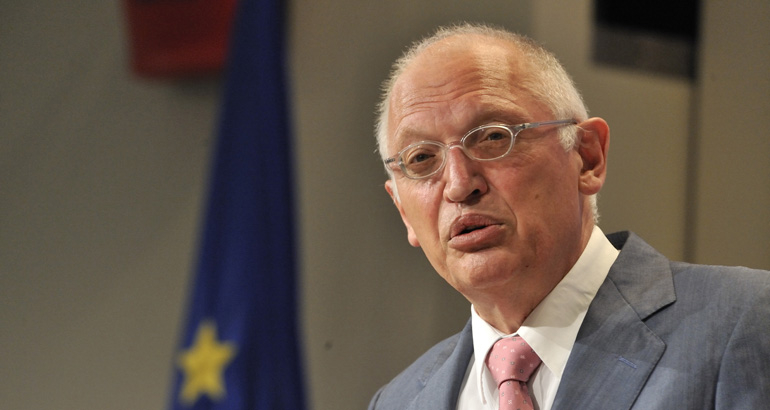
Günther Verheugen, European Commissioner for Enlargement (1999-2004), in an interview with Karolina Cygonek and Mariusz Sielski
Günter Verheugen (born 28 April 1944) is a German politician who served as European Commissioner for Enlargement from 1999 to 2004, and then as European Commissioner for Enterprise and Industry from 2004 to 2010. He was also one of five vice presidents of the 27-member Barroso Commission (Barroso I). After his retirement, he is now honorary professor at the European University Viadrina in Frankfurt (Oder).
Mr. Verheugen, in 1999 you joined the College of European Commissioners led by Romano Prodi. You accepted the portfolio of Commissioner for Enlargement and took an active part in the negotiations that ended in 2004 with accession of ten new member states to the European Union, the biggest accession in the history of EU. Would you recall and throw on the broader background why the “Big Bang” enlargement was so important for the applicant countries on the one hand and for the old “15” on the other, both politically and economically?
When the Prodi-Commission took office, the negotiation with 6 candidate countries had already started, however there was no clear strategy, how to organise the whole process politically, because some countries have been left out. The Prodi Commission presented a coherent strategy for the Helsinki Summit in 1999. The most important element was the proposal to conduct the negotiations with all candidate countries (12) simultaneously. The idea was, that each of the candidates should have the same opportunity to join the EU, based on its own merits. The possibility of a „big bang”, accession of 10 at the same time, emerged one year later, once it became visible that the progress was much better than expected. For the candidate countries, the “big bang” scenario was politically attractive, because nobody was left behind. Economically it did not impair their mutual cooperation. But the “big bang” was also the most sensible solution for the EU. Otherwise, the EU would have faced a long period of institutional instability, with an inherent risk of accident along the way.
Some pundits say, that decision about a massive enlargement of 2004 was somehow “political”, DG Enlargement made sure that economic and social factors had been taken into consideration though. Some experts claim that to certain extent only Estonia and Slovenia fulfilled all criteria of economic convergence and were the best prepared for their membership whereas other post-communist countries could have possibly generate problems for the EU as a whole. From nowadays perspective, was this decision about admitting those countries well-grounded?
The progress of all candidate countries was carefully monitored, without political interference. The reports of DG enlargement showed, that the candidate countries have achieved a sufficient level of preparation. The final decisions were made on the basis of their own merits and nothing else. The EU has carefully avoided any ranking. It is important to remember, that the Commission was not the ultimate decision maker. The member states decided, based on unanimity. Ant they were very keen to make sure that the accession criteria were fulfilled, not just on paper, but in reality. The European Parliament followed the same approach. The performance of the new member states after the accession demonstrated, that the right judgments have been made and Poland is a good example for that. Poland became a real success story in the first years after enlargement. In 2013 and 2014 international experts spoke about the “Polish miracle” and used the term of a “new golden age” for Poland.
For many years Poland was perceived as the most diligent pupil in the EU class. With the crisis around the rule of law, breaches of women and LGBT+ rights, attitudes towards climate change, Poland has been depicted since 2015, when Law & Justice came into power, as a subversive EU member – “a trouble maker”. How do you evaluate this evolution of Polish role and place in the European construction?
Poland was the biggest country among the candidate countries and therefore it was no surprise that the challenges had been bigger than somewhere else. I have to say that until now, some people in the so-called old member states still do not fully recognize the immense nature of the Polish transformation and the sacrifices, Polish people have made. The whole nation faced substantial changes, which affected every aspect of their lives. This is by no mean an abstract matter but affected directly the lives of millions. But the Polish people stood up to the challenges and were determined to do, what had to be done. We should also not forget the crucial role which Poland had played to bring down the Iron Curtain. It is true that we observe growing tensions between Poland and the EU institutions since 2015. Moreover, Poland does not fully exploit the opportunities of EU membership, because Poland has the potential to be one of the three leading countries in the EU. Right now it is obvious, that the strategic importance of Poland for the EU and the transatlantic alliance cannot be underestimated. Therefore, in my view, it is important to keep Poland on board and to have more trust in the wisdom of the Polish people. I am confident that the Polish democracy is strong and healthy .
How do you perceive nowadays the question of further enlargement of such countries as Moldova, Georgia and Ukraine in the context of war at Ukraine, at the EU eastern borders? How do you see the perspectives for these countries? How are these with respect to Western Balkans?
Since years, enlargement is no longer high on the EU agenda. In my view this is a serious strategic mistake. EU membership is the best instrument to create lasting peace and stability. The Western Balkan countries have a promise of EU membership since 1999. With the exception of Croatia (that was admitted in 2013), the situation looks rather gloomy and the perspective of an EU membership appears to be far away. This is a deplorable situation and in my view the EU bears some responsibility for it. There has never been a coherent strategy, which gave priority to these countries and encouraged substantial reform steps – why should people carry burdens without seeing the light at the end of the tunnel? With regard to Georgia, Moldova and Ukraine, I expect, that the war will create a political momentum for rethinking the enlargement. I am confident that the EU will consider an EU membership perspective for all three countries. However, that will be a long and bumpy road until accession, because we have to keep in mind that the accession criteria are formulated to safeguard the EU and future members as well. There is no road to a fast-track EU- membership, not if you wish to have a strong enlarged EU.
Enlarging and deepening the European Communities have been always a key-challenges for the integration. What is the current stage of EU evolving and how do you perceive current debate on the future of the Union as launched by the French President Emmanuel Macron?
The French President has made a valid point with regard to enlargement: candidate countries should be earlier rewarded for the reform efforts and should therefore see earlier benefits from enhanced cooperation with the EU. But this is very difficult to translate into reality. On the other hand, Macron is concerned about the functioning of the EU in a format of 27 plus x and I do not see any sensible answer to the questions he has raised. The EU has been built on the principle of equality among all members. In the decision-making process, however, it is also anchored that decisions must reflect the will of the majority of the population in the EU. Furthermore, there is the question, whether all member states shall have a Commissioner and so on. I hope that the discussion on the future of Europe will provide us with some options. Institutional questions are the very essence of the distribution of power in the EU and I am afraid there is no quick fix.
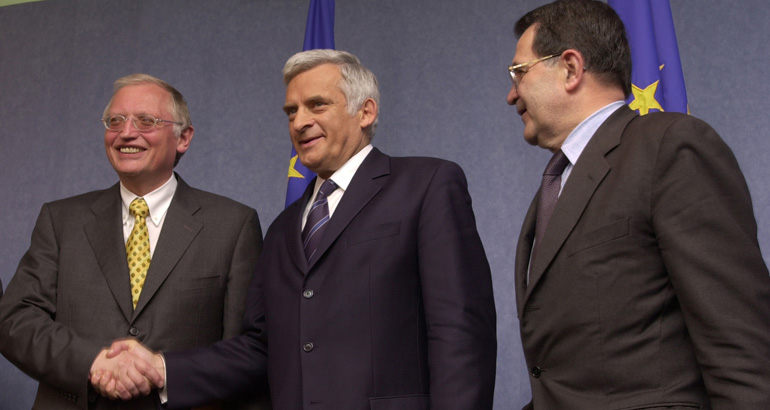
Jerzy Buzek, Polish Prime Minister, met Romano Prodi, President of the EC, and Günter Verheugen, Member of the EC in charge of Enlargement. The discussions served mainly to summarise Poland’s accession process (2001).
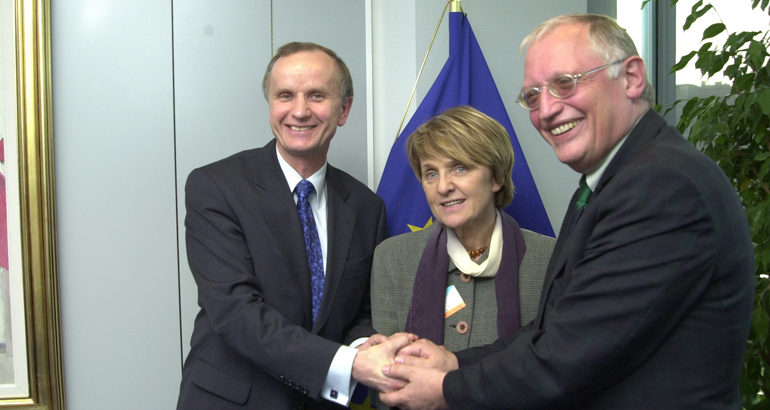
Grzegorz W. Kołodko, Polish Deputy Prime Minister and Minister for Finance, and Danuta Hübner, Polish Secretary of State for Foreign Affairs and Member of the Convention on the Future of Europe, met Günter Verheugen, Member of the EC in charge of Enlargment (2002).
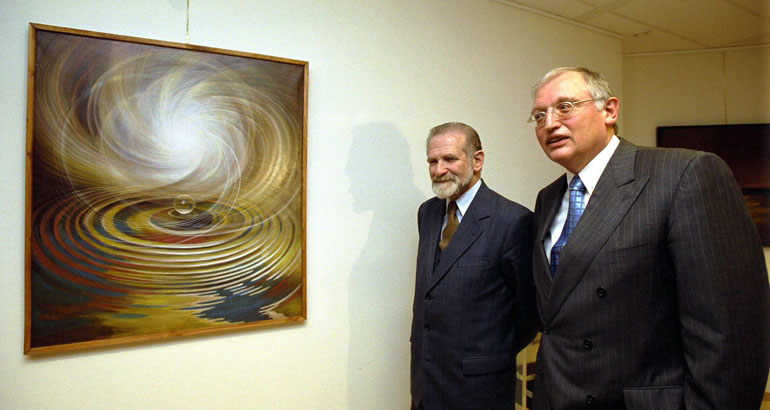
Günter Verheugen, Member of the EC in charge of Enlargement, inaugurated an exposition of Polish art in his office in the presence of Bronisław Geremek, Minister of Foreign Affairs of Poland (2000).

